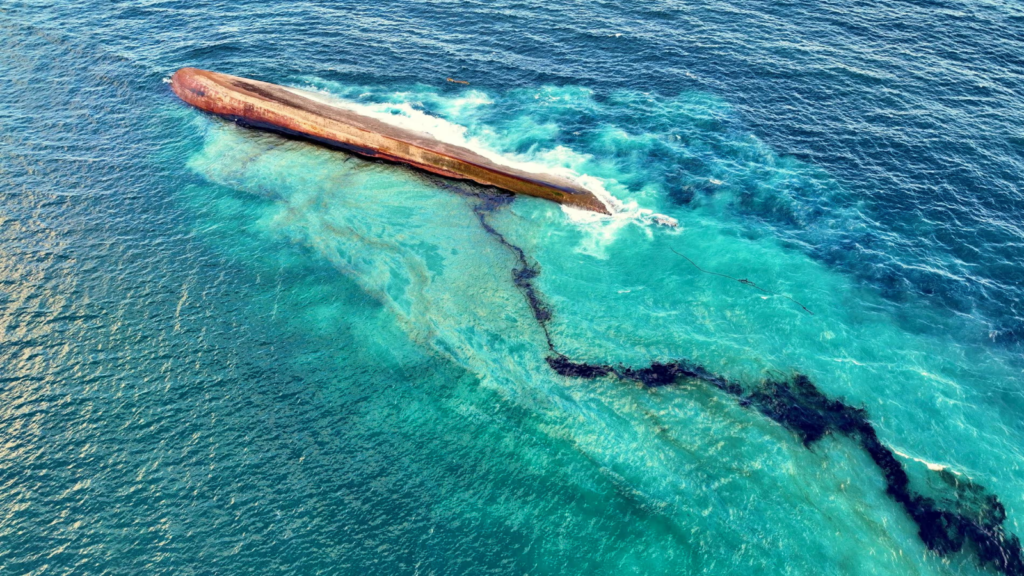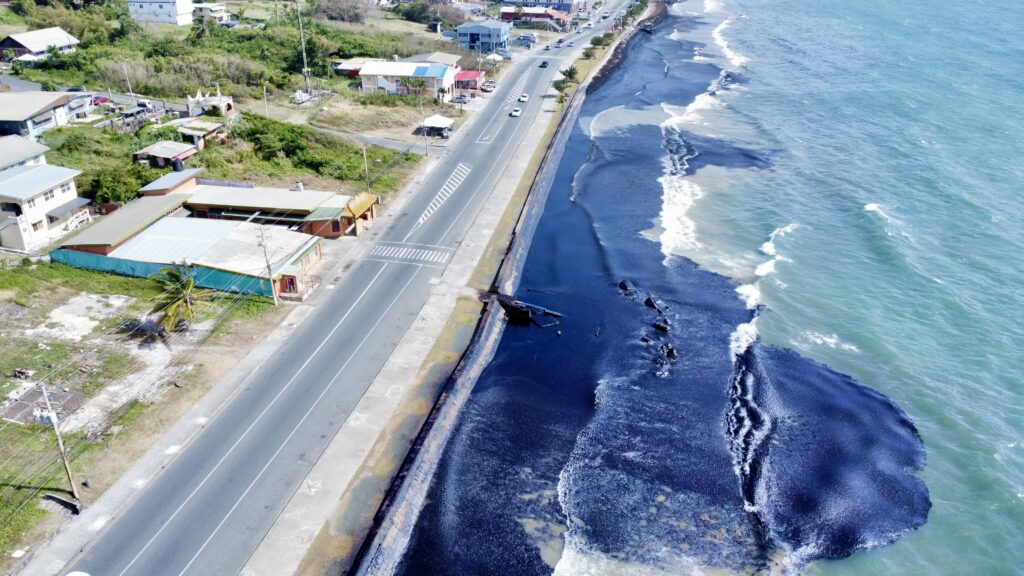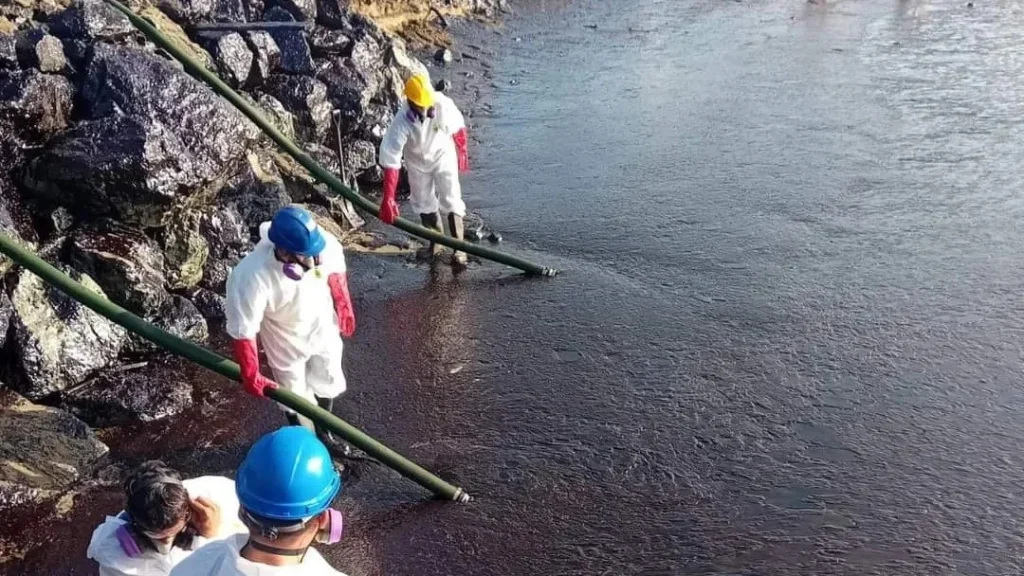Picture this: it’s February 8th. You woke up ready to get into the Carnival festivities. You check your phone and find a flurry of pictures on WhatsApp of yet another gruesome oil spill. This time, it’s in Tobago, known for its beautiful beaches and stretching expanses of crystal clear waters.
This is not a hypothetical situation.
Just over a week ago, the news of an oil-like substance spilling into Tobago’s waters surfaced.
Since then, oil has been gushing from a barge en route to Guyana which ran aground on a reef in the vicinity of Scarborough. The Prime Minister of Trinidad and Tobago, Dr Keith Rowley, has declared a national emergency and has considered raising it to a Tier III level emergency, which would signal the need for international assistance.
The oil is coming from a seemingly abandoned mystery barge, wantonly pouring toxins into the ocean. Nobody knows who owns this vessel (and hence who to pin the blame on) and I am beginning to hear horror stories from Tobagonian friends complaining about the fumes and the oil coating the eastern beaches.

Why is this bad news for Tobago?
Oil floats (see childhood experiments trying to mix cooking oil and water), so it’s easily spread by wind and currents. Birds are particularly at risk, as oil destroys the water-repelling quality of their feathers, and if they are diving for fish, they ingest oil along the way. Underwater creatures (fish, sharks, rays, dolphins, turtles, etc) are swimming through the oil, so they naturally ingest the pollutant.
For example, adult fish exposed to oil may experience lethal and sublethal effects like reduced growth, enlarged livers, changes in heart and respiration rates, fin erosion, and reproduction impairment.
Ever heard of fish kills? It goes hand in hand with an oil spill. That’s why it rhymes! Hahahaha 😭😭😭
My sweet sweet Tobago
Tobago has a reputation as a diving haven, perhaps even one of the best in the Caribbean since its marine life is so diverse and populous due to the inflow of nutrient-rich water from the Orinoco River. The clear water is home to large pelagic fish, giant manta rays, turtles, and dozens of colourful tropical fish. The healthy fringing and patch reefs, like the one-off Scarborough, host a multitude of species, including nurse sharks, moray eels, large barracuda and tarpon.

Continuous wave action emulsifies the oil (breaks it up into little particles that can be dispersed, basically) and spreads it through the water column, where it can smother seabed ecosystems like coral reefs and seagrasses. On land, oil soaks into the ground, which becomes tricky in complex systems like mangroves, where oil coats the roots and mixes with sediment. Humans become susceptible through three main pathways: inhalation (fumes), ingestion (food), and absorption (through skin).
Simply living near a spill or volunteering with cleanup can predispose one to effects ranging from dizziness and nausea to lung cancer. Oil fumes contain volatile organic compounds and airborne fine particulate matter, which are… not good for anybody.
Action is needed, and quickly…
We don’t know as yet how long-lasting this spill will be, but the public has already been advised by the Institute for Marine Affairs not to consume any fish from this area. We have just started the Lenten period when fishermen have more demand. Where does this leave the fishermen who make up 25% of Tobagonian employment?
Tourism is the mainstay of the Tobago economy. What effect will this have? We noticeably saw a loss of hundreds of millions of tourism dollars to Louisiana and surrounding states following the Deepwater Horizon catastrophe that remained for years, even after the beaches had been cleaned.
The Tobago Emergency Management Agency(TEMA) has mobilised its CERT core team and invited volunteers from the public to lend a hand in cleaning up the coastline. They’ve done a great job so far, but it is a Sisyphean task.

As of today, the 16th, the barge is still leaking oil. Tobago’s chief secretary, Farley Augustine, has confirmed that the barge is surrounded by booms to contain the surface oil but until we know exactly how much oil is in the barge and what it contains, we cannot plug the leak. Oil has now travelled into Grenada’s territorial waters (sorry guys, issa love) and is also threatening the Lowlands area of Tobago on the southwestern coast which houses the sensitive Buccoo reef-seagrass ecosystem. The Venezuelan authorities have offered technical assistance and are ready to cooperate with its maritime neighbour.
A bit of the mysterious cloud over the whole situation is starting to clear up. We now know the name of the barge, the Gulf Stream, and its connection with the tugboat the Solo Creed, but we have not been able to locate an International Maritime Organization registration number that would conclusively identify it.
The Gulf Stream is an unpowered barge, part of an articulated tug and barge system. Some nice people at Bellingcat along with volunteers teamed up to hunt down a culprit and it’s fascinating to read. For the time being, it seems that the Tobago government and the public will shoulder the cost.
Sargassum to the rescue?
In a surprising turn of events, the nearby mats of sargassum looming on the horizon absorbed a great quantity of oil and also acted as natural booms, preventing some oil from reaching the coastline. I like to see this as a silver lining for the stress that sargassum routinely causes to the Caribbean and we should continue exploring sargassum as a resource for our sustainable development. As they say, karma is a B.
Every time one of these disasters occurs, we have to reckon with the role that oil and gas play in our development as Caribbean islands. Extensive damages aside, I hope this unfortunate occurrence places us one step closer to a just energy transition and towards a fossil-free future, because God knows we can’t handle one more oil spill.